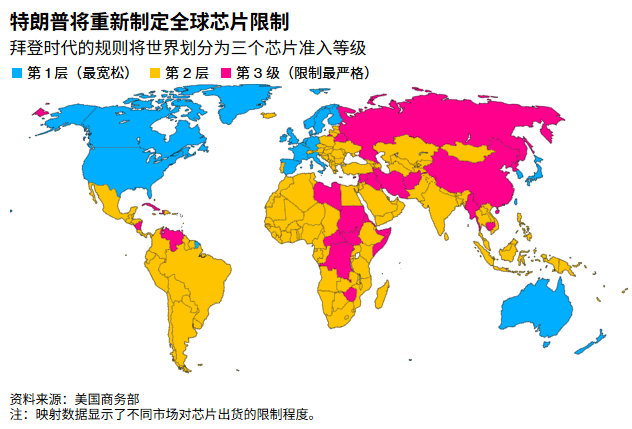The Trump administration plans to overhaul the regulations on the export of artificial intelligence semiconductors, discarding the approach of the Biden era, which had been strongly opposed by US allies and companies including Nvidia and Oracle.
According to a move announced by the US Department of Commerce on Tuesday, the United States will revoke the so-called AI export control rules introduced by President Joe Biden, which established three broad access tiers for countries seeking AI chips and were originally set to take effect on May 15. According to informed sources, the Trump administration is drafting its own plan and may shift to negotiating separate agreements with individual countries.
The agency said it will also issue guidance clearly stating that “the use of Huawei Technologies Co., Ltd.’s Ascend AI chips anywhere in the world violates U.S. export controls.” Additionally, the agency plans to warn the public about the potential consequences of allowing U.S. AI chips to be used in developing Chinese AI models.
The US Department of Commerce said in a statement on Tuesday that Biden’s rule “will demote the diplomatic relations of dozens of countries to second-class status, thereby damaging the US’ diplomatic relations with these countries.” The statement also said that it will issue a formal notice to revoke the rule and “in the future” issue a replacement rule.
The changes to the AI diffusion framework released by Biden in the final week of his term emerged during Donald Trump’s visit to the Middle East. Some Middle Eastern countries are angry about the latest restrictions. According to informed sources, Trump’s alternative regulations aim to strengthen control over chips overseas and are still under development.
The US Department of Commerce stated in a statement that regardless of the outcome, it will be “a bold and inclusive strategy aimed at developing US artificial intelligence technology in cooperation with trusted countries around the world while preventing it from falling into the hands of our adversaries.”
At the core of the ongoing policy debate is how to regulate the export of semiconductors to China. Due to concerns that advanced chips and artificial intelligence technologies could give China a military edge, officials in both the Trump and Biden administrations have sought to curb Beijing’s semiconductor ambitions.

Abolishing the AI diffusion framework will not change the measures recently strengthened by Trump against China. On the contrary, as governments around the world seek to develop domestic AI capabilities, this will provide new opportunities for other countries to negotiate chip access. These transactions may be influenced by investment commitments or broader trade and diplomatic considerations.
The United States first imposed comprehensive restrictions on the sale of advanced chips to China in 2022 and has repeatedly upgraded these measures, covering a broader range of the semiconductor sector and an increasing number of countries. This includes expanding the scope to over 40 countries in 2023, including most of the Gulf region and parts of Southeast Asia. Biden administration officials suspect that China may obtain banned technologies through middlemen. The AI proliferation rules announced in the final week of Biden’s term expanded these licensing requirements to most of the world.
This framework aims to further curb China’s ability to obtain US chips through third countries and bring more countries onto the US track by setting security requirements for accessing top US technologies. The rules include setting caps on total chip shipments to places like the United Arab Emirates and Saudi Arabia. Under the 2023 regulations, these countries must obtain approval from the US government to import advanced chips. The framework also imposes chip controls for the first time on dozens of countries including India, Malaysia and Poland.
One of the people familiar with the matter said that Trump administration officials plan to impose restrictions on countries that transfer chips to China, including Malaysia and Thailand. Meanwhile, according to people familiar with the matter, the US Department of Commerce will continue to strictly enforce existing chip export regulations. As the plan has not been made public, the people familiar with the matter requested anonymity.